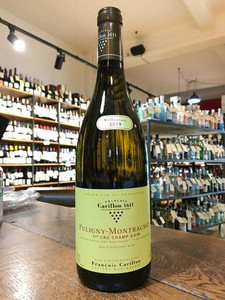
90-93, Burghound
2019 Chassagne-Montrachet “Les Macherelles”: (from a .72 ha parcel). A fresh, bright and citrusy nose speaks of ripe apple, poached pear and soft earth wisps. There is impressive density to the powerful and mouth coating flavors that possess fine depth and persistence on the balanced finale. This is unusually good for the vineyard. 2027+
2019 Chassagne-Montrachet “Les Macherelles”: (from a .72 ha parcel). A fresh, bright and citrusy nose speaks of ripe apple, poached pear and soft earth wisps. There is impressive density to the powerful and mouth coating flavors that possess fine depth and persistence on the balanced finale. This is unusually good for the vineyard. 2027+
The Producer
Between passion and precision
The François Carillon Domaine, created in 2010, is the long-lasting legacy of a wine family business that dates back to the 16th century in Puligny-Montrachet, a very typical wine village in south of Côte de Beaune - Burgundy’s most renown terroir for white wines.
Located in the heart of the village, the estate owns and manages today a sixteen-hectare-vineyard located in Puligny-Montrachet, Chassagne-Montrachet and Saint-Aubin. The estate produces about seventeen (depending on the harvests) different appellations, mainly in Chardonnay.
Between passion and precision, the ambition of the François Carillon Domaine is to produce fine, elegant and gourmet wines, representative of the exceptional terroirs from which they come. Referenced in best restaurants of the world, François Carillon's white wines are also praised by wine experts and wine lovers, who recognize their exactitude and balance.
A long-lasting legacy

The Carillon family have been growing grapes in Puligny-Montrachet for almost 500 years. Old written sources found in Puligny narrate the life and work of Jean Carillon as early as 1520. His family continued farming the land and the vineyard until the phylloxera crisis, which occurred in the late nineteenth century. Prosper and Jeanne Carillon then had to leave the region and work near Paris to provide for their needs, but soon returned for the love of the land and farming vines. The entire estate was replanted after the First World War. In the 1960s, polyculture and livestock breeding were abandoned in favor of the almost exclusive culture of Chardonnay by Louis Carillon.
François started looking after the family vineyards in 1988 and worked together with his father Louis and brother Jacques until 2010, when the estate was split between the two brothers.
Since 2010 and the creation of his own wine estate, François Carillon became a renown reference in Puligny-Montrachet for the refinement of his wines. Supported by a dynamic and cohesive team of a dozen people, François deploys his energy and enthousiasm to constantly increase his products’ quality and elegance, thus pursuing the development of the family affair with as much ardor as in his early days. He ensures the future of the vineyard by transmitting his know-how and love of his work to his four children.
François started looking after the family vineyards in 1988 and worked together with his father Louis and brother Jacques until 2010, when the estate was split between the two brothers.
Since 2010 and the creation of his own wine estate, François Carillon became a renown reference in Puligny-Montrachet for the refinement of his wines. Supported by a dynamic and cohesive team of a dozen people, François deploys his energy and enthousiasm to constantly increase his products’ quality and elegance, thus pursuing the development of the family affair with as much ardor as in his early days. He ensures the future of the vineyard by transmitting his know-how and love of his work to his four children.
The vineyard
| Everything starts in the vineyard. To get the best grapes as possible, François is deeply committed to a precise and environmental-friendly approach of vine-growing. The vines are thus managed as naturally as possible. Since 1992, weeds in all our parcels of vines are removed by plowing by tractor or horse, and no weed-killer is used. As our Head of Culture has been taking care of the same vines for almost 30 years, he has an exact knowledge of each parcels and can conduct specific actions so that the grapes can reflect precisely the terroir they grow on. Respect for the environment and living organisms is something François deeply believes in. Only natural-origin products are used, and only when required. Moreover, instead of burning vine shoots as it is often the case in Burgundy, we process them into small chips, compost and spread them in the vines. Coupled with horse manure, they enrich the soil without using chemical fertilizers. The vineyard density is around 10000 vines per hectare, enabling them to extract plant food and water from the terroir of Puligny. Pruning of the vine is performed manually (“Guyot” pruning) and yields are strictly controlled via disbudding as well as green harvesting. Grapes are harvested manually every year. |





